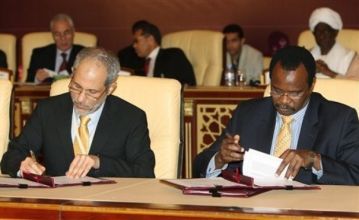Darfur peace agreement to be signed on 14 July
July 6, 2011 (DOHA/KHARTOUM) — A peace agreement between the Sudanese government and the Liberation and Justice Movement (LJM) is to be signed on Thursday 14 July, Sudan Tribune has learnt.

LJM top negotiator, Tadjadine Beshir Niam, confirmed on Tuesday that “the Liberation and Justice Movement will sign a peace agreement with the government on Thursday 14 July.” He said the decision after consultations between the mediation and the two parties.
He further called on the other rebel groups to join the agreement stressing that despite the differences “we all aim to achieve peace, justice and the welfare of Darfur people”.
Since last week the Sudanese government and LJM rebels have said they would sign a peace agreement between 15 and 20 July. The parties also said they are on the verge of resolving a divergence over the appointment of a vice president from Darfur.
Over 500 delegates representing civil society, IDPs and refugees and tribal leaders endorsed on 31 May a framework document for peace in Darfur as valid ground for direct talks between the government and the rebel groups to end the eight years of conflict.
The stakeholders conference further urged the Sudanese government and the rebel groups to “make every effort to reach a permanent ceasefire and a comprehensive peace settlement on the basis of this document”.
At the same five-day gathering, the government and LJM pledged to ink a peace agreement based on the document. JEM welcomed the text and called for direct talks saying it should tackle all the seven chapters of the framework document.
The UN Secretary General and Security Council, the African Union and the Arab League expressed their strong support to the Doha text and called on the government and the rebel groups to engage talks on the ground of the document.
JEM spokesperson Gibreel Adam Bilal said JEM executive body which is now in Doha will assess their participation in the Doha process after a meeting with the mediation before the signing of a peace deal between the government and LJM.
“We will discuss with the mediation the prospect of engaging talks on all core issues of the conflict,” he said. Adding that “if the government is prepared to enter into detailed negotiations we will resume talks.”
“But if the mediation has insisted that the document is ready (for the signing) and refuses to open negotiations, the Movement will not beg the government to negotiate,” he emphasized.
Qatar’s State Minister for foreign affairs Ahmed bin Abdullah Al-Mahmoud reaffirmed to Sudan Tribune that the mediation will not spare any effort to convince the Sudanese government and JEM to engage direct talks.
Al-Mahmoud stressed that “the Doha Document is not a peace agreement but a framework for talks between the Sudanese parties as it proclaimed in the stakeholders conference and steadily repeated by the international and regional partners.”
He however stressed that a compromise should be found in order to break the deadlock.
Speaking from Ouagadougou, the Burkina Faso Foreign Minister and Joint Chief Mediator Djibril Bassole told Sudan Tribune he will fly to Doha to meet with the members of JEM executive bureau on 10 July in order to discuss their position and to find out a common ground between the parties.
Bassole further stressed on the need to include all the rebel groups underlining that the purpose of the framework document is to allow the different armed movements to conclude peace agreements with the government separately or together.
The Sudanese officials said JEM is not serious in its desire for peace but only seeks to avoid international sanctions if they withdraw from the Doha process. Khartoum however said the content of the Doha document can be signed as a peace agreement without modifications.
“The question facing the two Sudanese parties is to see up to what extent they can concede to each other as the full opening of the document might mean another peace process, and another agreement,” said a western observer close to the file.
(ST)
